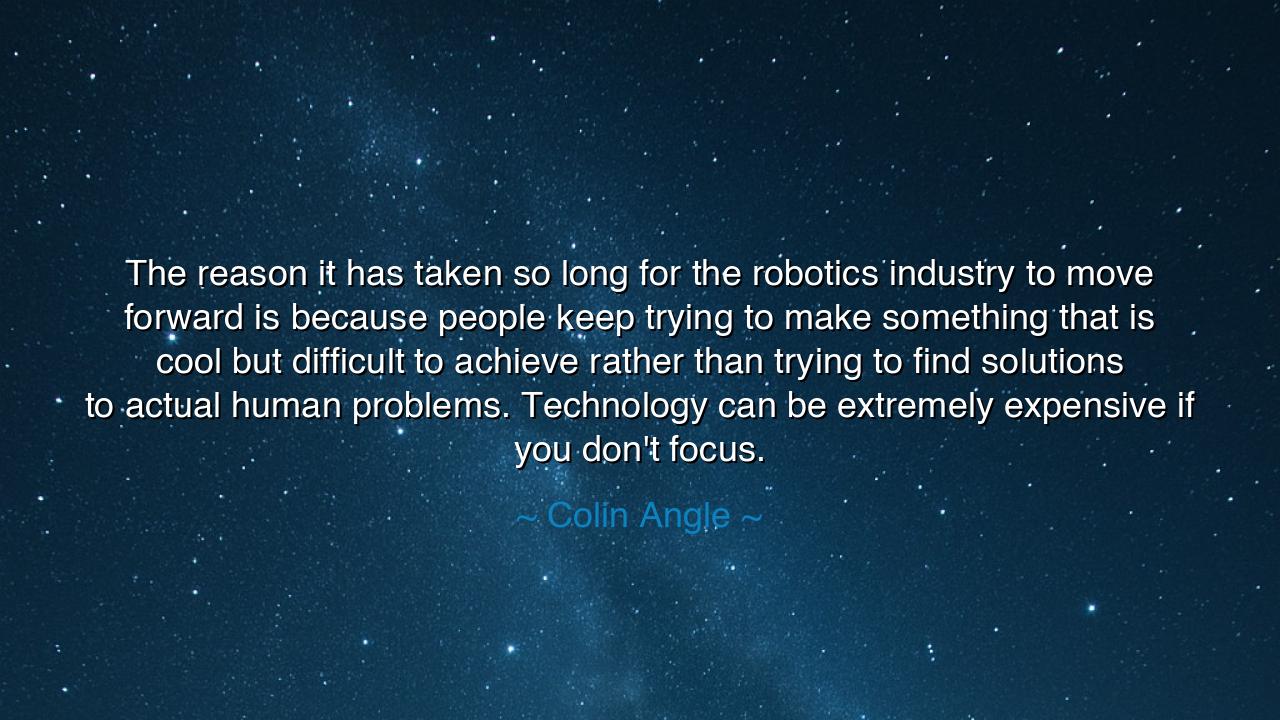
The reason it has taken so long for the robotics industry to move
The reason it has taken so long for the robotics industry to move forward is because people keep trying to make something that is cool but difficult to achieve rather than trying to find solutions to actual human problems. Technology can be extremely expensive if you don't focus.






"The reason it has taken so long for the robotics industry to move forward is because people keep trying to make something that is cool but difficult to achieve rather than trying to find solutions to actual human problems. Technology can be extremely expensive if you don't focus." These words from Colin Angle, a visionary in the field of robotics, carry a timeless lesson about the true purpose of human innovation. In an age when technology races forward with breathtaking speed, Angle points out a fatal flaw in our pursuit: the obsession with creating things that are simply impressive or "cool," rather than focusing on solving real-world problems. This serves as a profound reminder for all who strive to create or innovate—true progress lies not in the complexity of the creation but in its utility for the human experience.
In the earliest days of human invention, men and women crafted tools not for the sake of showing off their craftsmanship but for practical use: to hunt, to build, to survive. Think of the wheel, a seemingly simple object that revolutionized human civilization. It was not created out of a desire to be admired but out of a pressing need for movement, efficiency, and progress. Over time, however, humanity's inventions became increasingly complex, with some driven by vanity or the desire for admiration rather than necessity. Yet, the path to true advancement has always been one of humility and focus—making life better for those who came after us.
Angle’s warning resonates across the ages, reminding us that technology is not an end in itself. It is a means—a tool to enhance our lives. For a long time, the robotics industry, much like other technological fields, has been driven by the allure of creating machines that seem "futuristic" or "cool." The spectacle of these creations captures the public's imagination, but the question remains: Do these innovations truly solve the pressing issues of our time? Too often, they are solutions in search of a problem. When the focus shifts from human needs to mere novelty, we lose sight of the greater mission of innovation.
This same principle can be seen in the life of Thomas Edison, a name synonymous with invention. Edison did not set out to create technology for its own sake; his relentless pursuit was to improve human life—to bring light to the dark, to power machines that could enhance productivity and ease suffering. His focus was always on finding practical solutions, and though many of his inventions were groundbreaking, it was his vision that truly transformed the world. His work was driven not by a desire to impress but by the desire to serve humanity.
Indeed, the cost of technological innovation can be immense when it lacks a clear and focused purpose. The resources—time, money, and energy—spent on chasing after unreachable ideals can drain entire industries. Think of the massive resources poured into projects that failed to deliver, or the countless inventions that, while technologically impressive, failed to meet any real human need. Focus, Angle advises, is the key. Without it, technology becomes a mere distraction—a spectacle that dazzles but does not improve.
The lesson here is not merely for those who work in robotics or technology but for all who seek to create, innovate, or lead in any capacity. Whether in business, art, or everyday life, we must always ask: Is this effort serving a greater purpose? Are we solving real problems, or are we creating solutions in search of a challenge? Innovation, true innovation, is the art of focusing on necessity, and it requires a deep understanding of the human condition—the needs, struggles, and desires that drive us.
So, let us not be dazzled by the glimmer of complexity or the allure of impressing others with what we can create. Instead, let us center ourselves in the quiet wisdom of focus. Let us create not for the sake of creation but for the sake of bettering the world around us. For it is only when we align our efforts with the needs of humanity—in all their richness and complexity—that our innovations will truly shine. The future, in all its promise, belongs to those who understand that the greatest creations are those that serve others.






AAdministratorAdministrator
Welcome, honored guests. Please leave a comment, we will respond soon